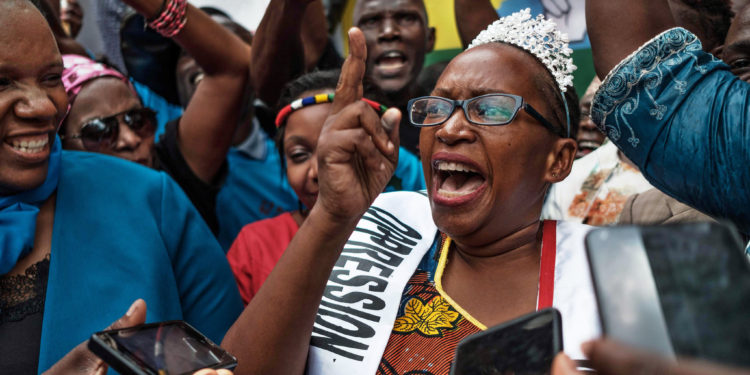While Uganda celebrates her women annually, it is still dangerous to be a woman in the opposition in Uganda today!
By Dr. Stella Nyanzi
Increasingly, women in Uganda get excused from the drudgery of housework on one day each year. This is 8th March. Their husbands, brothers and sons take over the cooking of food, cleaning of the house and childcare activities. These (mostly upper- and middle-class) women wake up late, take breakfast in bed or at the dining-table, dress up in fine dresses, and go out to socialize with other well-dressed women. Some women participate in power conferences or seminars with imported keynote speakers and local panelists speaking English words about issues fashioned around the national or international theme of the day. Some women march with placards announcing their demand for one freedom or else decrying one form of abuse or another violation. Some women go to the hair-salon, manicurist, sauna, bar or disco. Some women might watch a football match either at a field or on television with neighbours. Some attend a music show, theatre or cinema. Many other women stay home just taking life easy. And yet many other women – due to patriarchy, ignorance or class prohibitions do not mark the International Women’s Day, let alone know about it.
I address four questions about this assumed universal commemoration of women, namely 1) What is the origin of International Women’s Day? 2) Why is it celebrated annually? 3) What are the salient issues for women in Uganda? 4) Who are my women icons currently?
While we only mark one day in Uganda, other countries mark Women’s Week or even Women’s Month. For example, in the United States of America, the whole of March is devoted to Women’s History and focuses on political and economic achievements such as celebrating suffragist gains including the right of women to vote and contest in elections, better pay for women that is more equal to men’s compensation, girls accessing education through public endowments and funds similar to boys, formation of key associations for women such as the National Women’s Party, and historical demonstration marches for women’s rights.
It is remarkable that many Ugandans celebrate this international public holiday without necessarily knowing how it came about. In 1910, during the International Conference of Working Women held in Copenhagen, Denmark, an activist called Clara Zetkin who was a leader of the Women’s Office for the Democratic Party in Germany tabled the idea of an International Women’s Day to highlight women’s demands. Her proposal met with unanimous approval of over 100 women from 17 countries. This led to the first celebrations of this day the subsequent year in 1911. The first four countries to mark this day were Austria, Denmark, Germany and Switzerland. For decades, International Women’s Day lacked the universal scope it enjoys presently.
However, in 1975, the United Nations began celebrating 8th March as International Women’s Day with an annual message from the Secretary General. Two years later, in 1977, the United Nation’s General Assembly gave two justifications to member states annually marking this day, namely, a) to recognize the fact that securing peace, social progress and the full enjoyment of human rights and fundamental freedoms require the active participation, equality and development of women, and b) to acknowledge the contribution of women to the strengthening of international peace and security.
Whether a day, week or month is apportioned by a nation to honour its women, this commemoration is devoted to celebrating the achievements of women as individuals, organisations or communities, assessing progress in attaining equity for women and girls, as well as highlighting any critical challenges facing specific groups of women and girls. Given multiple glass-ceilings that allow women to climb only so far, but not any further, it is important to increase the visibility and amplify the stories of trail-blazing women in diverse fields including science, technology, culture, religion, economics, politics, military, security, education, sports, music, creatives, health, finance, trade, policy-making, etc.
Ugandans celebrated International Women’s Day at the beginning of March which followed the 2021 national elections of the President, Members of Parliament, City Mayors, and Local Government Councilors. Celebrating women in the aftermath of election-related violence, state brutality by armed officers, wanton abductions and torture during interrogation under illegal detention of opposition members, discontent about widespread claims of a rigged election was an act of stoicism. Further complicating this national context, is the wider grim context of a global pandemic of COVID-19 which led to the shutdown of the country starting in March 2020. The shutdown yielded massive unemployment as several income-generating sectors were closed down for months, public and private transport was banned, the night economy was shutdown by compulsory curfew, closure of education institutions, prohibition of social-cultural communing including routine religious gatherings, sports events, musical shows, restaurants, leisure industry, hair-salons, etc. The gap between the rich and the poor was exacerbated. It is against this national and international background of a violent elections season and the COVID-19 lockdown that Ugandans celebrated Women’s Day this year.
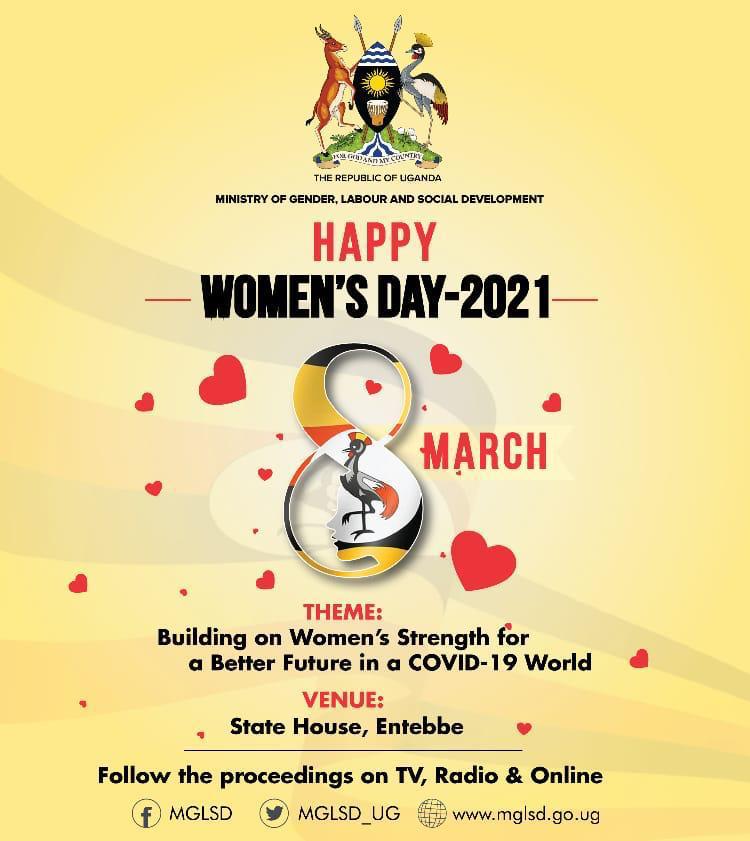
The erasure of undervalued women in the care-economy was shed in sharp relief during the COVID-19 crisis in the country. Many families fled from the cities to the villages where they abandoned the care responsibility to mainly grandmothers. These rural-based grandmothers bore the burden of taking care of grandchildren indefinitely closed out of schools in the country. Similarly, midwives in hospitals and traditional birth attendants in rural herbal shrines continued delivering babies throughout the lockdown. Unlike national borders and economic activities, birthing processes were not shutdown even when the president ordered the total lockdown of the country. Market women traders supplying fresh food items were ordered to remain in the food markets all over the country. They were required to sleep at their market stalls and endure the indignity of days without adequate sanitation or hygiene facilities. To add insult to injury, some of these market women traders were assaulted by Local Defense Unit officers who caned them supposedly for breaking curfew prohibitions against being on the streets either too late or too early. Of course, nurses, doctors and other allied healthcare workers must be celebrated for carrying the nation through the crisis of a new airborne pandemic. All these women, must be hailed!
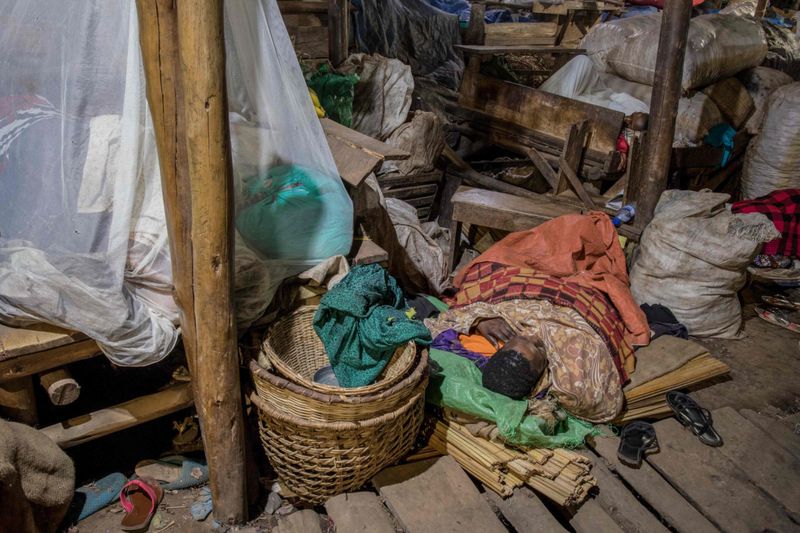
However, privileged women in corridors of power must be critiqued for their varied roles in facilitating the siphoning and misappropriation of government funds and resources gathered for fighting against COVID-19. While on one hand, one celebrates the leadership of the two female Ministers of Health who offered leadership to the COVID-19 Task-force, as well as Members of Parliament (led by a female Speaker of Parliament) who approved budgets that prioritized policies and programs to manage multi-pronged effects of the pandemic, one must not lose sight of allegations of massive corruption and self-aggrandizement from the Corona Cash Bonanza that fattened Uganda’s elite. While the feminine virtue and caring attributes of women are often celebrated, one must assess how virtuously the women in Uganda’s leadership decided about funding priorities manifest in diverse supplementary budgets submitted to and approved by our Members of Parliament.
The post-election moment in Uganda witnessed a woman Justice of the Supreme Court proffer the sole dissenting view from a bench of nine judges in the singular presidential petition against the declared win of Yoweri Museveni. Although she was not the only woman among the bench of nine, she was autonomous and independent enough to stand alone in the highest court of the land. It is noteworthy that similar to the two female Ministers of Health, female Speaker of Parliament, and other women in privileged positions of political power in Uganda, this judge is a role model for other younger women aspiring for power in Uganda’s formal structures. Moreover, importantly for women in the opposition in Uganda, it is important that we have examples of powerful privileged women who dare to challenge the status quo -however costly the price.
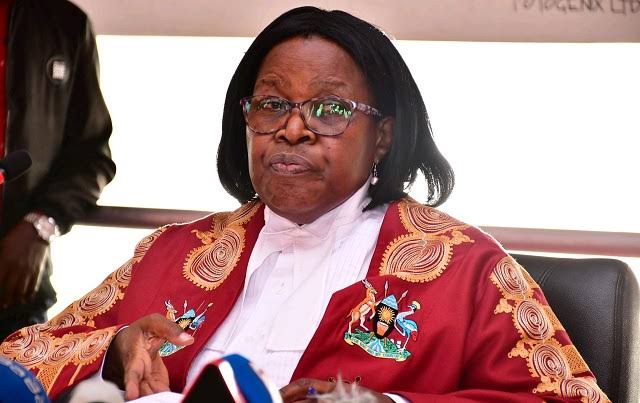
In this regard, I celebrate all women and girls who support and subscribe to the fight for freedom in Uganda. I applaud all who are actively involved and participate in the struggle for liberation of our country. Some have been arrested, charged in courts, detained, tried, convicted, sentenced, abducted and tortured during illegal detentions. Some have lost husbands, lovers, sons, fathers, brothers, uncles or cousins, but they keep steadfast i their thankless work for the liberation of Uganda. Some are threatened with murder, torture, imprisonment, rape, blackmail, extortion and damaging propaganda. Some have lost their employment opportunities and battle against economic sabotage. Some have had their bank accounts frozen, travel documents confiscated, homes raided, and children followed by spy intelligentsia. Some have paid the ultimate price of their lives. And in this regard, I name and celebrate Ritah Nabukenya of the People Power Movement who was murdered by a police truck that knocked down the bodabodamotorbike carrying her to witness court proceedings of the Anti-Social Media Tax protestors. Alas, while Uganda celebrates her women annually, it is still dangerous to be a woman in the opposition in Uganda today!
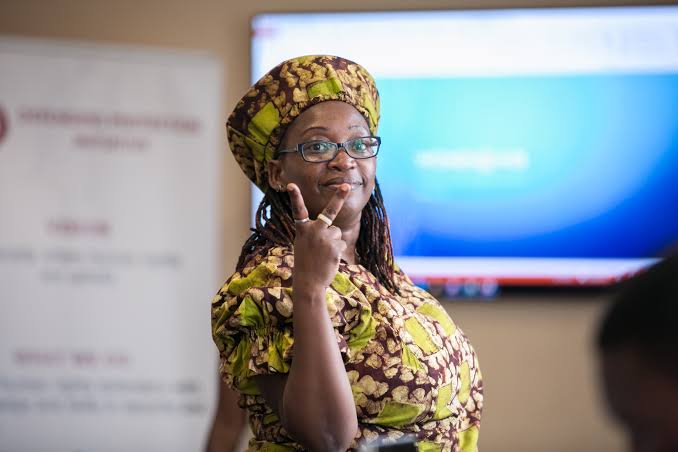
Dr. Stella Nyanzi is a Ugandan human rights activist, poet, medical anthropologist, feminist, queer rights activist, and scholar of sexuality, family planning, and public health.


